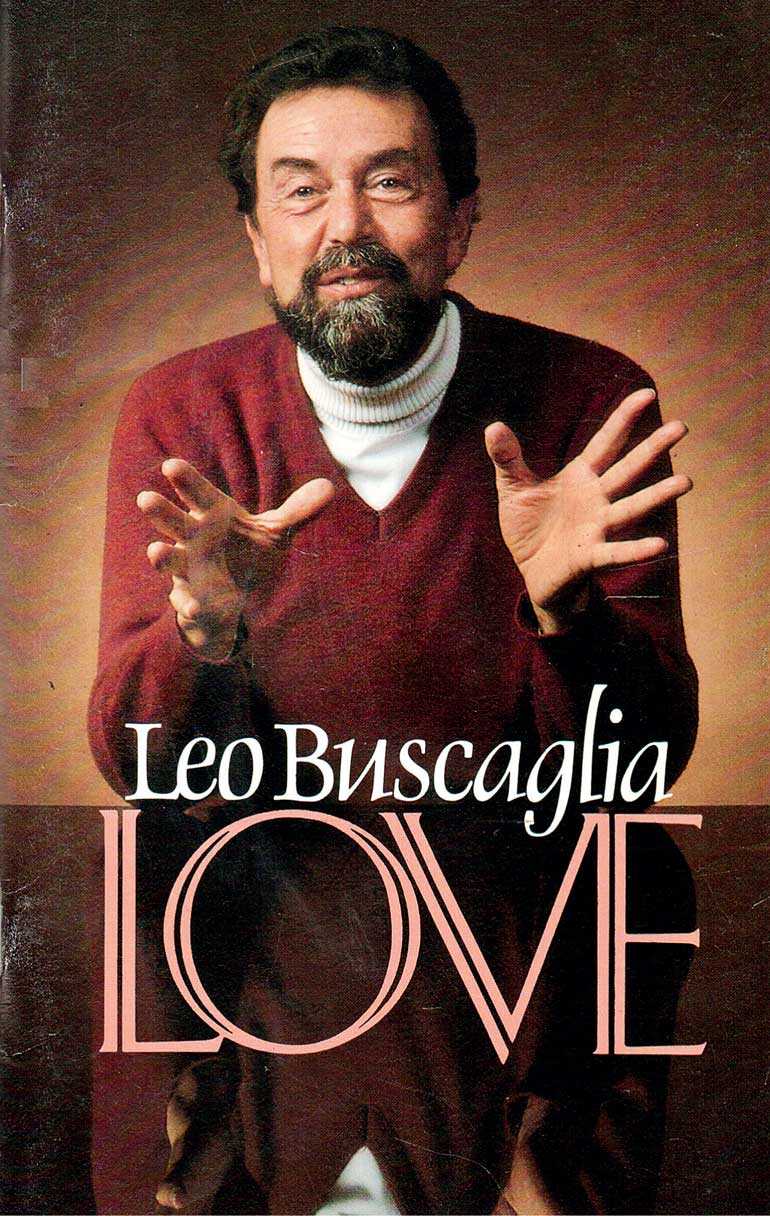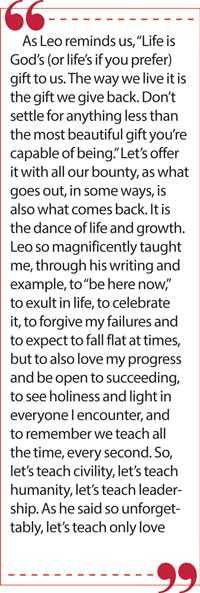Monday Feb 16, 2026
Monday Feb 16, 2026
Friday, 3 July 2020 00:30 - - {{hitsCtrl.values.hits}}

This is a series of articles outlining the teachings of some of the world’s most seminal thought leaders. We have selected those I have personally interacted with, in many cases worked with, and delivered  with. We will present a one-day session in August synthesising these learnings in a highly interactive format. And this will hopefully give you a flavour of the insights in advance.
with. We will present a one-day session in August synthesising these learnings in a highly interactive format. And this will hopefully give you a flavour of the insights in advance.
Thought leader #1: Leo Buscaglia
Leo Buscaglia, whose name flamboyantly intoned, sounds almost like an operatic aria, became associated with the word “Love” as he published the first-ever book, titled ‘Love’. Hailing from the Swiss-Italian Alps, raised by remarkable, gusto-filled parents, Leo became an exemplar of drinking deeply from life’s experiences, its tragedies as well as its treasures. The book went on to become a global best-seller, and established Leo as ‘Love’s Spokesperson’.
While at university, I developed an initial correspondent relationship with Leo and was baffled and buoyed by his remarkable, encompassing energy. Leo as a university professor in Southern California also taught the first college accredited course on “Love”. I can’t help but thinking we have gone backward not forward, in not building on that vision, and not having that crucial focus area as a locus of really virtually everyone’s development and education.
Love is learned
Leo pointed out that “love,” which infiltrates and modifies virtually all of our behaviour is taught, and therefore is also learned. That also implies that “hatred” is learned and so is “contempt” and “dismissiveness” and “judgment,” the veritable three Horsemen of our human interaction Apocalypse. But if any of this is learned it can be unlearned, and relearned, and therefore perhaps “life” should be at least in part a learning journey.
Elie Wiesel, the great Jewish sage and educator told teachers they had to ensure they educated children in humanity and not just in facts, lest we produce more educated Eichmanns and learned monsters…the “over-educated” and “under-humanised” perpetrators of Nazi atrocities. So, life’s learning journey is to learn to be human, to learn what love is and how to grow into it. 
It is not “natural” and anyone who thinks all families are wonderful role-models of loving needs to look around at this planet and the terrifying statistics of our lack of learning in terms of how to connect and communicate, and the heart-breaking debris of everything from divorces to armed conflicts.
Coming out of yourself
A seemingly simple concept, but if we are constantly concerned by how we “appear” then we slavishly follow the herd. If we come out of ourselves to acknowledge others, and share our own passion for exploration, we are pulled out of the haze of perpetual ego maintenance.
Why are we trained to so earnestly and insistently need to be constantly approved of? And in seeking that approval, what parts of ourselves do we silence, numb or even kill off?
Leo told the story of speaking to a large crowd, and as he often did, he looked for “friendly eyeballs,” people who seemed to really “get” the message, who seemed to be saying, “Go on, go on!” And in one gathering of teachers and students, he alighted upon a particularly lively set of “friendly eyeballs,” and this lady seemed radiantly interested in imbibing all of his heartfelt message and outpouring.
Months later, when Leo was back, he asked about her, and described her to the teachers. They said this remarkable, young woman, who was literally “dying” of depression and isolation, a week later, had left a note and decided to end her life. Leo said he was stunned. It reminded him how easy it was to be a “sage on the stage” and not see beyond those eyeballs.
He wondered what might have happened if he had followed up with her, given her his card, had a coffee with her, cried with her, put her in touch with resources who could be companions on her journey. What happened was not his fault certainly, but surely as he reminds us, we can find bridges across our own sense of isolation, to each other. As Leo says, “human being take my human hand, and perhaps we won’t be as lonely anymore.”
Work on yourself
The word “educare” (from which “education” comes) means to “draw out of” not “dump into” someone. So, we are educated when our capabilities are evoked, when we truly evolve. And one way to see if we are truly evolving is to see how often we surprise ourselves with what emerges. And looked at the other way, when was someone last surprised by what you said, conveyed, did or seemingly felt?
The reason to work on ourselves, to hone ourselves, to support and affirm ourselves, in part, is because you can only give away what you have and who you are. If you are demented, desperate, behind emotional bars, then your love primarily can only really afflict me, limit me, lock me up. Now if we can accept that and share it in vulnerability and humility, then the act of sharing those wounds in love becomes medicinal, as we “accept” these limitations, they stop “limiting” as we support each other in them and through them.
And working on yourself also means to work on your talents, your callings. As best we know there hasn’t been another exact you, biologically, genetically, in terms of DNA, in the history of the universe. Is that meaningful or meaningless? Perhaps there truly is a part of the human tapestry that is yours, a “splash” of distinctive humanity we can’t get anywhere else, at work or at home, and if you don’t give it to us, we lose it. And rather than extolling that and celebrating that, so much of conventional upbringing and “parenting” seems to be about suppressing that.
We are told to act conventionally, draw an accepted construct of reality, repeat accepted nostrums of how things are. And while it is natural that we must understand the conventions we may look forward to transcending, the aim is surely that, not to just kowtow to some bland sameness. That cannot be how we produce tomorrow’s leaders.
What is really essential?
Years ago, well before his fame, Leo took a trip across Asia, yearning to hear the ringing of crystal clear temple bells near Angkor Wat. He went to Cambodia, and over Christmas he shared the Christmas story, of Mary having to give birth in a manger as there were no “rooms in the inn”.
The Cambodians who often slept four across on a floor, couldn’t comprehend it. They asked, “Why didn’t they let the poor woman in? How much space does a family with child take?” They were baffled. Weeks later as Leo was leaving, someone tugged on his sleeve, still clearly very concerned, “But Leo, I still don’t understand, why wouldn’t they let the poor woman in?”
Leo said when he settled into his little hut, the villagers hearing there was a stranger in their midst, all brought presents. Leo points out that as per his Western upbringing, he had been taught that if someone gives you a gift, you have to give them one in return. He had nothing to give them, so he gave them his socks and underwear! Later he told the story ruefully, wondering what he thought these villagers would use the underwear for? As hats?
When the monsoons came and water levels rose, these villagers gathered everything they owned, and families got on rafts together, living there together, often for months. Leo said it made him wonder, “If you lost everything Leo, what would you take? Your music system? Your TV? All your clothes? What is really essential?
And then a year later, back in LA, Leo’s house was hit by an earthquake and he did literally lose everything. And Cambodia came back to comfort him, and all those irrepressibly smiling faces. He says he saw the sunlight through the ruins, and thought, “This beautiful world goes on Leo, with you or without you.” And it also reminded me of the great Greek piece of theater, when Medea is asked, “Everything is gone. Destroyed. What is left?” And Medea answers, “What is left? There is me!” Amen!
A book everyone should read, or revisit, is the so-called “children’s classic” ‘The Little Prince’ by Antoine de St. Exupery. And in it is the remarkable line, “It is only with the heart that one sees rightly. What is essential is invisible to the eye.” Yes, what “is” really matters beneath the surface, our essence, our sense of being. As a marvellous San Francisco author observed, “I am neither a sacrilege nor a privilege. I may not be competent or excellent. But I am present.” Hallelujah!
Being fully alive
We “kill” people’s spirit with cruelty and spite and indifference and dismissiveness. As Leo Rosten observed, “It is the weak who are cruel. Gentleness can only be expected of the strong.” There is grace in gentleness, and true glory.
And what do we too often teach? How to suppress, how to keep what we think and feel hidden, to build facades. We keep it in, and it implodes, and we end up medicated or in an asylum, a literal or metaphorical one. Existentialist despair surges when we become truly detached from ourselves. And one way we impoverish our inner life is by impoverishing our language. We just learn to loudly broadcast outrage. And yet we fail to relay the nuance, the richness, the full texture of what we’re experiencing.
We chuckle at Don Quixote, Cervantes’ “demented” knight whose religion was civility, and who thought he could save the world by behaving as a knight and doing battle with the enemies of civility. Well, he charged windmills and got knocked on his “doopy” (as Leo characterised it), but we still talk about him today. He immortalised the valour of fully showing up. He saw the beauty in an everyday woman who therefore became the beautiful, “Dulcinea” in his eyes and eventually her own eyes. The world couldn’t take it, and as this mad, glad knight passed, a light passed from the world, but some of it remained. It always does, lingering in others, the impact carries on.
And you wonder then as we “judge” students why we seem so much better at tearing them down rather than building them up? Unfortunately, some have misconstrued that as “esteem at all extremes.” No, don’t defraud them by destroying standards. But support them in gaining competence and being comfortable being uncomfortable as they explore doing so.
Why do we just write “failed” or “not up to par?” Why don’t we first celebrate what they get right? Leo grading papers with a teacher was confounded by a student’s work, and wrote enthusiastically on the paper, “It’s a C paper by the requirements. Let’s work on that. But, while your syntax needs work, and your punctuation seems straight out of James Joyce, your passion here blew my world.” Wow! The conversation Leo said that led to. And the youngster even got turned on to Joyce!
If students don’t learn, why don’t teachers ever examine if the way they are teaching is incompetent? What if we invited everyone to excel, and made “standards” a way to gain capability and did not use them as a foundation to assess worth or viability, so that in anger and self-defence we reject the standards, rather than enjoying them and expanding our competence through them?
So, let’s support each other, as Leo tells us, by risking ourselves in growth. Let’s dare to get involved in experimenting with our own lives. The opposite of love as he reminds us is not hate, it’s apathy.
Finally, as the Zen masters teach us, all paths in life are the same. The only question to ask of any path is, “Does it have a heart?” And if it does, and it calls to you, follow it with all of yours.
Live forward
It doesn’t even matter who we’ve hurt, we all flounder, bungle, fail. It matters that we learn not to hurt others in that way again. We take our lives in our own hands, kiss it, and go on. We find people we feel at “home” with, people who first put the bandages on, and hug the agony away, and then, and only then, gently yet firmly say, “Let’s learn from this, I did tell you so.”
We teach each other all the time. We teach people not to trust, or that the world isn’t safe, or that everyone is out for their own advantage. Or we teach civility, and trustworthiness, and kindness and understanding. As Leo says, “Teach only love.” Let that be our conviction and commitment. And when we fail, suffer, wail, weep, we can get in that groove for a bit, but we can also insist on learning from all of that only what serves you and humanity.
So, if what is essential is invisible to the eye, can the next hug be remarkable, can the next act of listening be devotional, can dinner tonight be a true sacrament? Our egos are our “caged selves” as Leo points out. That inhibited and perverse part of ourselves is what gets us to build walls of isolation around us, and so the whole world is dying of loneliness, needing to get drunk or loudly obnoxious to shout out in some way, to seek to quell that infuriating emptiness. Could we not let go of the walls, burrow through them, go under them or climb over them, and allow ourselves to go more holistically, exuberantly a little “nuts” in terms of society’s bland strictures?
What is essential once more we ask? Are our addictions essential? And what all am I addicted to, behaviourally and otherwise? And all these “default settings,” can I decide to outgrow them? Leo once mischievously called this, “The Paraphernalia of the Anti-Self.” Oh, they all flocked to that talk!
But perhaps we can realize it as something simpler. As Leo says, “A single rose can be my garden…a single friend, my world. Love is life. And if you miss love, you miss life.”
And then here’s the gauntlet he throws down. As Leo reminds us, “Life is God’s (or life’s if you prefer) gift to us. The way we live it is the gift we give back. Don’t settle for anything less than the most beautiful gift you’re capable of being.” Let’s offer it with all our bounty, as what goes out, in some ways, is also what comes back. It is the dance of life and growth.
Leo so magnificently taught me, through his writing and example, to “be here now,” to exult in life, to celebrate it, to forgive my failures and to expect to fall flat at times, but to also love my progress and be open to succeeding, to see holiness and light in everyone I encounter, and to remember we teach all the time, every second.
So, let’s teach civility, let’s teach humanity, let’s teach leadership. As he said so unforgettably, let’s teach only love.